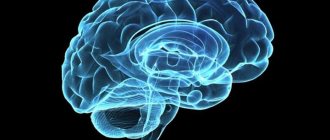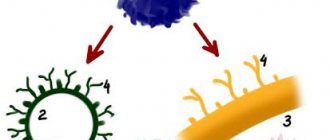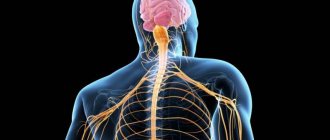Many people are interested in what a neurologist treats in adults and when to contact him.
A neurologist is a medical specialist who diagnoses and treats pathologies affecting the central and peripheral nervous system.
To become a neurologist, you need to graduate from a medical school with a degree in general medicine or pediatrics and specialize in neurology.
When to consult a doctor
It is recommended to consult a specialist if:
- headaches and dizziness, especially if they are accompanied by nausea and increased blood pressure;
- shooting pains in the face;
- pain in the limbs, back and neck;
- decreased sensitivity (pain, temperature);
- progressive muscle weakness;
- stiffness in the body;
- trembling, tingling and numbness of the limbs;
- uncontrolled movements of the arms or head;
- convulsions, fainting states;
- insomnia or increased sleepiness;
- constant night awakenings;
- apathy, depression;
- increased nervousness, irritability;
- panic attacks;
- chills or hot flashes;
- loss of balance and ability to coordinate movements, unsteadiness of gait;
- memory impairment;
- violation of taste and smell;
- periodic loss of vision;
- the appearance of tinnitus;
- speech disorders.
Often, diseases of the nervous system manifest themselves with uncharacteristic symptoms. In such cases, a therapist can refer you for a consultation with a neurologist.
It is recommended to visit a specialist annually for preventive purposes.
Reasons for contacting
Depending on the health of a particular person, his temperament and the type of personal reactions, the symptoms of nervous disorders can be very individual. But there are a number of signs that are inherent in most cases:
- long-term sleep disturbance;
- increased irritability and neuroses;
- chronic fatigue syndrome;
- severe unreasonable anxiety;
- constant desire to sleep;
- a sharp decrease in ability to work and activity;
- absentmindedness;
- difficulty concentrating on a specific action or object;
- noticeable deterioration of short-term memory;
- obsessive thoughts;
- panic attacks.
Often all these signs do not add up to the overall picture and are ignored for a long time by a person who needs the help of a doctor. All of the above signs can be perceived as a change in mood, emotional exhaustion, moral fatigue, etc. But for a specialist, a combination of these signs will indicate a certain disease.
Over time, physical manifestations of the disease are added to the above conditions:
- dizziness;
- severe shortness of breath;
- neuralgia;
- feeling of strong heartbeat;
- difficulty swallowing and enlarged thyroid gland;
- digestive disorders (constipation or diarrhea, stomach pain, flatulence);
- lack of appetite;
- increased body temperature after stress;
- surges in blood pressure.
The most common symptom that accompanies most mental disorders is a severe headache that occurs periodically. In severe cases, it is combined with fainting.
What diseases does the specialist deal with?
Let's try to find out when a neurologist will help, what he treats in adults.
The doctor treats neurological disorders:
- intracranial hypertension;
- nervous tics, tremors;
- cranial and spinal injuries, as well as their consequences;
- Alzheimer's and Parkinson's diseases;
- multiple sclerosis;
- stroke and its consequences;
- paresis and paralysis;
- neuralgia, neuritis, plexitis;
- migraines, headaches;
- pain in the neck and back;
- painful prolapses caused by nerve damage;
- seizures, epilepsy;
- cauda equina syndrome;
- torsion dystonia;
- encephalopathy;
- osteochondrosis;
- radiculitis;
- intervertebral hernia;
- Wilson-Konovalov disease;
- Crouzon and Dandy-Walker syndromes;
- arachnoiditis;
- leukodystrophy;
- myasthenia gravis;
- neurofibromatosis;
- blepharospasm;
- syringomyelia;
- vertebrobasilar insufficiency;
- meningitis, encephalitis;
- insomnia;
- sleep apnea syndrome;
- tumors of various etiologies.
The listed diseases are often accompanied by changes in mentality and behavior. In this case, it may be necessary to consult a psychiatrist or psychotherapist.
Causes of neurological pathologies
- Age-related changes in the body.
- Disruption of the circulatory system.
- Injuries and bruises.
- Infections. A huge number of viruses, bacteria and parasites can infect the nervous system. For example, herpes virus, chickenpox, toxoplasmosis.
- Intoxication of the body with various substances (chemical, toxic, narcotic, medicinal)
- Heredity.
- Poor nutrition and, as a result, lack of vitamins.
- Malignant tumors.
What does a neurologist treat in children?
A pediatric neurologist will help with:
- developmental delay;
- attention deficit symptom;
- Down syndrome;
- hyperactivity;
- convulsions and fainting;
- epilepsy;
- polio;
- hydrocephalus;
- phenylketonuria;
- West syndrome;
- cerebral palsy;
- birth and hypoxic lesions.
The specialist also monitors infants, which allows timely detection and elimination of the slightest pathologies.
How to become a neurologist
Before you start working in the field of neuroscience, you must first acquire the relevant knowledge and skills. Namely:
1. Obtain a higher medical education:
2. Complete residency in Neurology
In addition, the ability to correctly “read” X-ray and tomographic images is necessary.
Skills in manual therapy and osteopathy are also desirable.
The work of this specialist also requires:
- analytical mind;
- good memory;
- skills to communicate with people;
- balance, endurance and patience;
- readiness to provide assistance at any time;
- a mood for “continuous learning”: reading scientific articles, attending conferences, etc.;
- emotional stability;
- Ability to detach emotionally and maintain professionalism.
How does a neurologist differ from a neurologist?
Now you know who a neurologist is and what he treats in adults. Who is a neurologist, and how does he differ from a neurologist? It turns out that these are two names of the same profession.
In connection with frequent disorders in the functioning of the nervous system, a science was created that studied the structure and functions of the nervous system, clarified the mechanism of failures, and developed methods to cure existing pathologies. It was called neurology, and specialists began to be called neuropathologists. In the 80s of the last century, changes occurred in the Ministry of Health, as a result of which neurologists were renamed neurologists.
Centuries-old history
Science Neurology is a respectable lady. Doctors of ancient Egypt and ancient Greece also described symptoms of paralysis and epilepsy. And ancient Chinese healers skillfully practiced acupuncture.
This science and its followers received full recognition in the 19th century with the advent of Jean Martin Charcot. The scientist devoted his life to searching for relationships between the manifestations of diseases and the area of damage to the nervous tissue.
Another great neurologist is George Parkinson. He discovered Parkinson's disease and described it in detail.
In Russia, the development of Neurology is associated with such great names as Sergei Korsakov, Ivan Sechenov, Vladimir Bekhterev, Ivan Pavlov, Alexey Kozhevnikov. Thanks to the latter scientist, Russian neuropathology became a separate clinical discipline. In addition, Alexey Kozhevnikov created the world's first neuropathological clinic and described the classic manifestations of special seizures. Later they received the name “Kozhevnikov epilepsy.”
How does the consultation work?
At the first appointment, the doctor listens to the patient’s complaints and collects an anamnesis of the disease. He asks about age, marital status, characteristics of professional activity, finds out the localization, nature and intensity of pain, factors causing pain, the presence of chronic and hereditary diseases. Then he examines the patient, conducts palpation and tests to assess visual and olfactory acuity, speech skills, reflexes, coordination of movements, sensitivity, and muscle strength.
Diagnosis and treatment
After a visual examination, the neurologist refers the patient for examination, which may include:
- echoencephalography of the brain;
- neurosonography;
- myelography;
- electroencephalography;
- electroneuromyography;
- cerebral angiography;
- ultrasound encephaloscopy;
- Doppler ultrasound scanning;
- CT, MRI or PET;
- lab tests;
- lumbar puncture.
Based on the diagnostic results, the doctor makes a diagnosis, determines the cause of the pathology and individually selects the optimal treatment, taking into account the type and stage of the disease, as well as the general condition of the patient and the presence of other diseases. It includes taking medications, injections, massage, physiotherapeutic procedures, physical therapy, biofeedback therapy, and psychotherapeutic techniques. In severe cases, surgery may be necessary.
During an exacerbation of the disease, the doctor may prescribe bed rest. During the treatment process, he monitors the patient’s condition and, if necessary, makes treatment adjustments. At the end of the treatment course, the neurologist gives advice to avoid relapses.
How to get an appointment
If the patient understands which doctor to contact, then this must be done as soon as possible. If the patient has doubts, then it is advisable to go to a therapist, who will identify a specialist.
In order to choose a qualified doctor, you need to pay attention to the following features:
- sufficient practical experience in the treatment of nervous disorders;
- an integrated approach to determining the patient’s condition;
- It is desirable to have scientific articles or works in the area that the patient is faced with;
- sufficient initial consultation time (at least 30 minutes).
At the appointment, the doctor will determine the further direction of the examination, if necessary. Having all the necessary data, he will be able to make a diagnosis and prescribe drug or non-drug treatment. If necessary, the patient will be recommended a course of treatment in a hospital.
Consultations with a doctor online Taking care of your health is a life priority for everyone.
Communicate with doctors online and receive qualified assistance without leaving your home. Try it Please note! The information on this page is provided for informational purposes only. To prescribe treatment, you must consult a doctor.
Advice from a neurologist
The proper functioning of the nervous system is important for the health of the body, as it controls the coordinated functioning of all organs.
To avoid nervous diseases, it is recommended to follow several rules:
- eat rationally;
- sleep 7-8 hours a day;
- to refuse from bad habits;
- doing physical exercise;
- walk in the fresh air for at least 2 hours.
You can make an appointment with a neurologist at Ryazanova Private Office LLC by phone or using the online form “Request a call back”. Our administrator will call you back and select the best time for you to visit a specialist.
What can the doctor prescribe?
After diagnosis, the neurologist prescribes treatment. It can be conservative and operative.
Conservative treatment methods include:
1. Use of medications
2. Physiotherapy
3. Therapeutic gymnastics
Each of the nervous diseases has certain risk factors. They can be different habits, types of work, psychological conditions. The neurologist analyzes the patient’s lifestyle, identifies these factors and makes recommendations for eliminating them.
In other words, changes in the patient’s lifestyle play a very significant role in the treatment of nervous diseases.
Important! Nerve tissue recovers slowly. Therefore, good neurologists always try to preserve it, using the entire range of conservative treatment methods. And only in the most severe cases, the neurologist resorts to radical treatment - surgery.
The operations are performed by neurosurgeons.











